Irony DefinitionIrony is a rhetorical tactic used to convey a desired meaning through language that, when read literally, would indicate the opposite. The Oxford Learner's Dictionary describes Irony as "the use of words that say the opposite of what you really mean, often as a joke and with a voice tone that shows this." 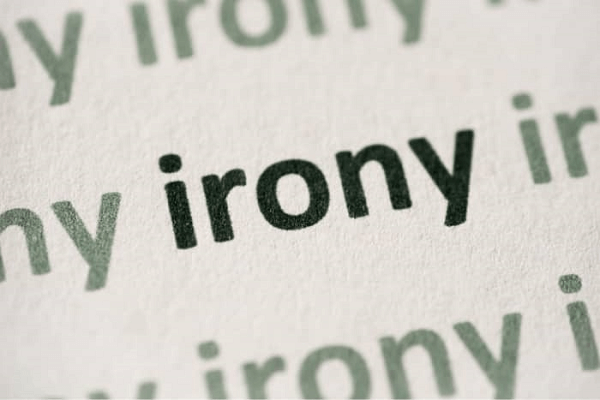
Irony is described as "the use of words to express something other than and especially the opposite of the literal meaning" by the Merriam-Webster and Collins dictionaries, respectively. It is also described as "a subtle form of humor that involves saying things that you do not mean" by the Oxford English Dictionary. Irony is defined as "the use of words that are the opposite of what you mean, as a way of being funny" by the Cambridge Dictionary. Definition of IronyThe use of Irony highlights any disparity or inconsistency between what is perceived and what is actually true. The phrase "how ironic" implies the exact opposite of what it actually means. An ironic phrase implies one thing while really saying another. For instance, you may exclaim, "What a beautiful day!" if it were a chilly, wet, dreary day. Alternatively, if you had a severe case of food sickness, you may have said, "Wow, I feel great today." Both of these are instances of Irony, namely linguistic Irony, which is the most common kind of Irony. Types Of IronyThere are several types of Irony. Irony is not the simplest literary device to recognize, and it may be a difficult issue to discuss. This is due to the fact that not all ironies have the same appearance. All of the many forms of Irony are based on the premise that the expected result differs from the actual result, albeit each has different reasons. These results may include words that don't make sense in relation to their intended meaning or discordant happenings in a tale. 1. Situational IronyWhen a situation's conclusion drastically departs from what one would anticipate, situational Irony is present. In everyday life, situational irony can happen. A sort of situational Irony is, for instance, witnessing someone complain about Facebook in a Facebook post. Perhaps a fire station burns down, or a marriage counselor gets divorced. Situational Irony is demonstrated in each of these cases. 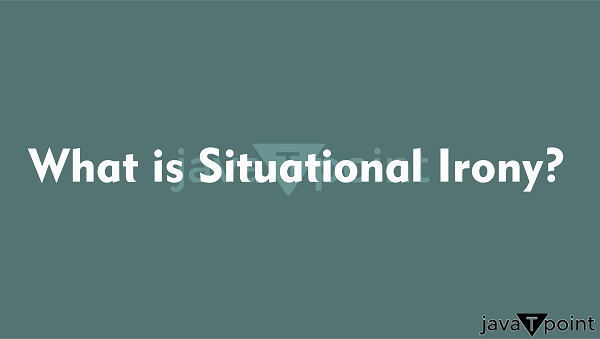
Situational Irony in books can increase tensile force or result in a brilliant story twist. It serves as a method of teasing readers about what will happen next. What happens when the killer is killed off in the middle of the narrative? Situational Irony can take four forms: cosmic, poetic, structural, and historical. Cosmic Irony Cosmic Irony happens when an external force, such as a deity, magic, or fate, steps in and produces ironic circumstances. It's possible for a character to make a god's appeal, which makes the issue more difficult. Poetic Irony Poetic justice and poetic irony are two similar terms. It normally happens to a nasty character. Therefore, this ending is perfect. This is an instance of the cliche "the punishment fitting the crime." One such instance is the early demise of a character who strives for immortality at any cost. Structural Irony When a character isn't aware of their predicament, it's called structural Irony. This may be a case of a character being ignorant or being a "fish out of water" clich�. They might not be aware of their status as the Chosen One or the impact of their deeds. Historical Irony The reverse of what a character expected to happen as a result of their desired outcome is what is known as historical Irony. It can also imply that a character's values alter over time in a way that compromises their initial objectives. One explanation for this might be if a time traveler killed Hitler, causing Nazi Germany to win the war with a new leader. Alternatively, it's possible that a character who sets out to defeat power-hungry adversaries develops a power-obsessed personality. 2. Verbal IronyWhen someone says one thing but means another, they are engaging in verbal Irony. This occurs if the literal meaning of a remark departs from the meaning the author or character intended. 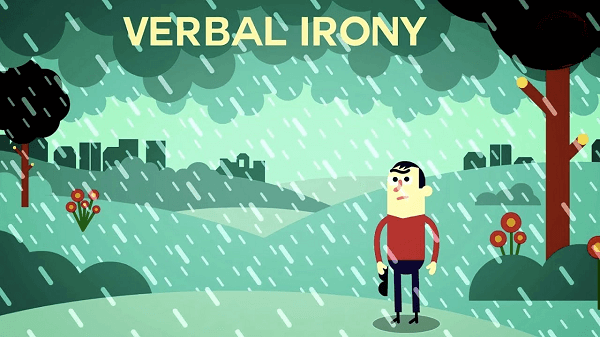
Although it's not always hilarious, verbal Irony can be a method to add humor or lightheartedness to a tale. Additionally, it can be utilized to anticipate events or intensify character conflict. Sarcasm, understatement, and overstatement are the three main categories of verbal Irony. Sarcasm When someone intentionally states the opposite of what is true in order to be sarcastic or even unpleasant, this is known as Sarcasm. For example, Sarcasm is when you refer to your sister as your favorite child after she ruins your favorite clothes. Understatements Verbal Irony can sometimes take the form of understatements. Litotes are a particular kind of understatement used to make an affirmative assertion while making a negative one. Using the phrase "she's not the nicest person" to describe an extremely unsympathetic character is an example of a litotes. Overstatements Irony also exists in exaggerations. Hyperbole occurs when there is a significant overstatement, as in the phrase, "I'm so hungry I could eat an entire hippo." Socratic Irony is also a form of linguistic Irony, although it has a somewhat different function in literature. 3. Dramatic IronyThe third main kind of Irony seen in the literature is dramatic Irony. Dramatic Irony happens when characters are unaware of what is happening while the reader or audience is aware of it. 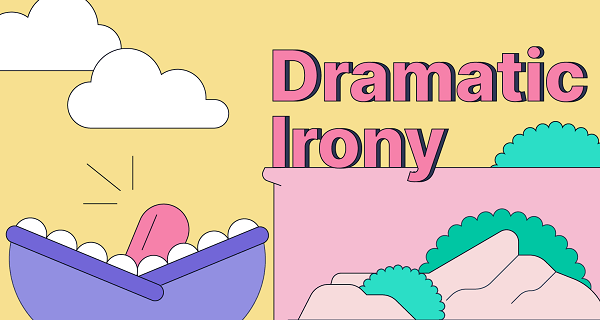
Dramatic Irony is the most effective at creating suspense among all ironic styles. The crowd anticipates a shoe-drop moment. They wish to correct the characters they see making poor decisions. Additionally, dramatic Irony makes it possible for readers to pick up on additional verbal and foreshadowing ironies. It emphasizes the emotional side of a tale and sheds light on the challenging decisions that characters have to make. Sad Irony is the phenomenon in which the characters are attempting to avert a sad event while the spectator is aware that it will happen. Dramatic Irony, however, isn't always doomed and gloom; it's frequently used in romantic comedies when the spectator already knows that two characters will get together before the characters do. 4. Socratic IronySocratic Irony is the last kind. Socrates' teaching style and use of Sarcasm are to blame for this. By acting as though you don't know the answer, you can use the Socratic Technique to pose focused queries. 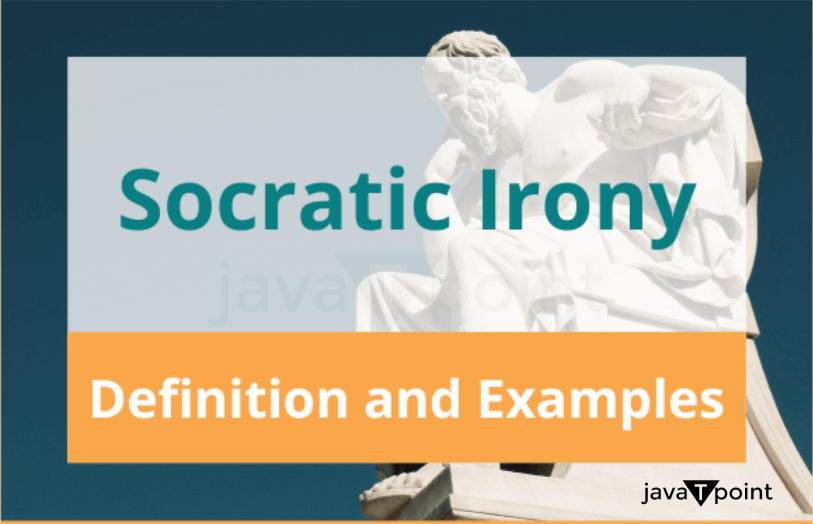
The irony, according to Socrates, isn't limited to the classroom. A person or character pretends to be ignorant in order to get information using this rhetorical Technique. It typically appears in courtroom dramas and police procedurals since it's usually used to persuade a person to plead guilty. Another way to employ Socratic Irony is to expose a person's ignorance or flaws in their reasoning. Examples of IronyExample 1A seagull perched on a sign that reads "no seagulls" is a common image used to illustrate Irony. According to the sign's wording, seagulls are not permitted in the region. The seagull on the sign not only defies it but also draws attention to how ridiculous it is to attempt to control where seagulls may or may not go, which makes us giggle. Example 2Another illustration would be an escalator running parallel to a stairway going to a fitness center. No one is on the stairs, and every one utilizing the escalator is a gym client. Given that this is a gym, we anticipate that everyone here is committed to their health and exercise, and as a result, they would use the stairs, which provide free workouts. However, despite traveling such a distance for nothing more than to exercise, people prefer the escalator's convenience. Irony and comedy emerge from the repeated breaking of our expectations. Example 3Famous English mystic Aleister Crowley, who advocated that anybody could achieve anything if they could control their own thoughts, passed away from heroin addiction in the early 20th century. This is odd because the manner of his passing totally conflicts with what he preached. Example 4In the well-known short novel, The Gift of the Magi by O. Henry, a husband sells his cherished watch in order to get combs as a gift for his wife. In the meantime, the woman sells her lovely locks so she may get a watch chain for her husband. The characters' acts go against what each other would expect of them, and their attempts to exchange presents only serve to waste them. Example 5The main character's name is just one example of the linguistic and situational Irony found throughout Edgar Allen Poe's The Cask of Amontillado. Despite having a lot of bad luck throughout the novel, he is given the name Fortunato, which is Italian for "fortunate." Example 6There is water around, but not a drop to drink. This passage from Samuel Coleridge's "Rime of the Ancient Mariner" highlights the grim Irony of a seafarer who is drowning from thirst on his boat even though he is surrounded by water. Advantages of Using Irony in WritingThe following are some advantages that authors might gain by using Irony in their writing: 
1. Plot device Irony is an effective story technique in many different ways. Unexpected occurrences or character actions heighten a literary work's comedy, keep readers guessing, or have a more lasting effect on a readership. Readers are given the opportunity to reassess their prior knowledge, expectations, and comprehension when Irony is used as a story technique. Because of this, authors may draw readers' attention to certain topics while also surprising them. 2. Releasing Technique Irony is a literary device that may be used to reveal more than just unexpected developments or narrative twists. Characters are made far more complicated and lifelike by using discrepancies in their behavior to highlight them. By upsetting the audience's expectations and presumptions, Irony can also expose prejudices on their own. It serves as a good tool for authors in this regard. Irony continues to be one of the most misused words, with some individuals using it to describe any form of comedy or Sarcasm. True Irony, which can take many different forms, entails a discrepancy between what is implied by appearances and what ought to be the case. Irony may play a significant part in advancing a tale and developing its meaning. How it affects the reader depends on the story and the author's intentions. 3. Revealing Character Personalities and Motives Verbal Irony is extremely similar to Sarcasm or a figure of speech in that one character says or acts the exact opposite of what he believes. This method of Irony might provide the reader with a better understanding of each character's nature. A character that is frequently caustic or dishonest may not be someone you can trust or who is going to hurt another character. It is likely that the character is ignorant and unnecessarily trusting if he trusts a character who is unreliable despite the fact that he shouldn't. Verbal Irony can also be employed by one character to criticize or point out the shortcomings of another. This may be observed, for instance, in Shakespeare's "Julius Caesar," when Mark Antony constantly refers to Brutus as an "honorable man" while speaking at Caesar's burial, despite the fact that Brutus killed Caesar in a most dishonorable manner. 4. Reader Knowledge In a dramatic irony, the reader is more aware of what will occur than the characters are or what is already happening. As an illustration, readers are introduced to Della and Jim, a poor couple who adore one another and long to give each other Christmas presents, in "The Gift of the Magi" by O. Henry. They need to know the other to sell a valuable item of their own to get the money they require because neither has enough money to buy a nice gift. Jim and Della each sell their prized timepieces, including Della's stunning long hair. It is ironic that Della buys a watch chain for Jim's watch, and Jim buys combs for Della's long hair. Because the reader is aware of what will happen to a character and may witness that character behave against their interests, dramatic Irony can evoke intense emotions in the reader. Despite knowing that both presents in "The Gift of the Magi" would be worthless, the reader may still perceive that the purchases were motivated by love. 5. Moral and Practical Lessons Contradictions between what the characters think can, should, or will happen and what actually does are a common element of irony. It's possible for the reader to feel strong emotions that can be utilized to teach them anything important or moral. Aldous Huxley's "After Many a Summer Dies the Swan," which is about Jo Stoyte's age, has an elderly, affluent man who is obsessed with extending his life, much like a baron whose papers he has hired a researcher to examine. The baron's obsession with continuing to live had led to his physical and mental deterioration into an ape-like state, even while he remained alive throughout the novel. Stoyte learns this upon his arrival in England, where he has traveled to learn what happened to the baron. The irony in this circumstance is that obtaining something that many people want so badly only comes at a price that most people would find objectionable. ConclusionIrony is a figure of speech in which words are utilized such that their intended meaning differs from the real meaning of the words. This post has made Irony more understandable for you. That would undoubtedly be ironic if it had just increased your confusion. |
 For Videos Join Our Youtube Channel: Join Now
For Videos Join Our Youtube Channel: Join Now
Feedback
- Send your Feedback to [email protected]
Help Others, Please Share










